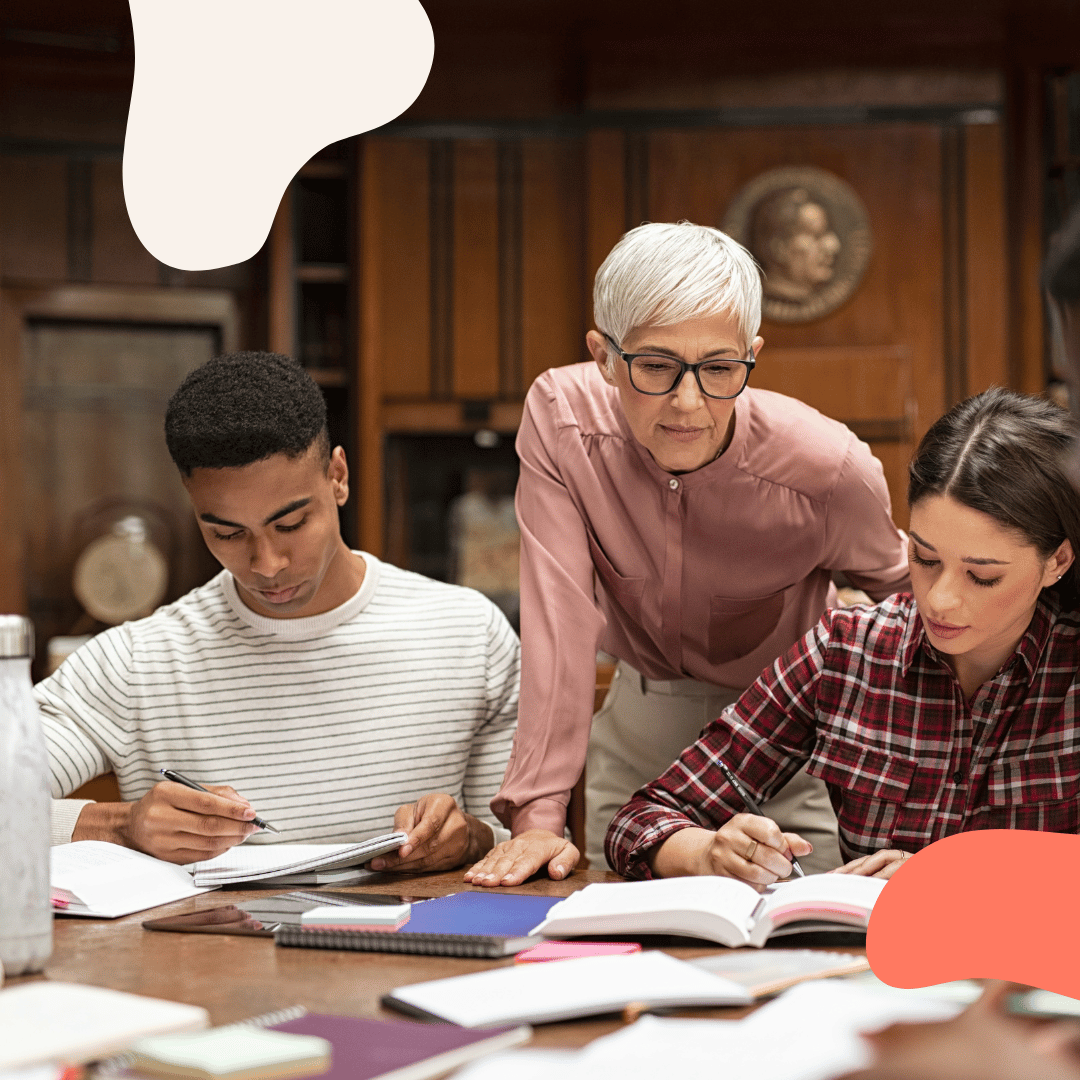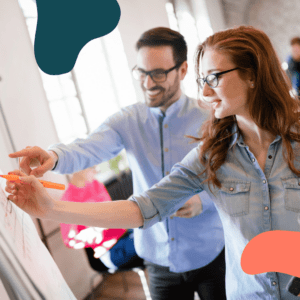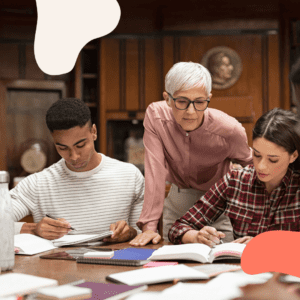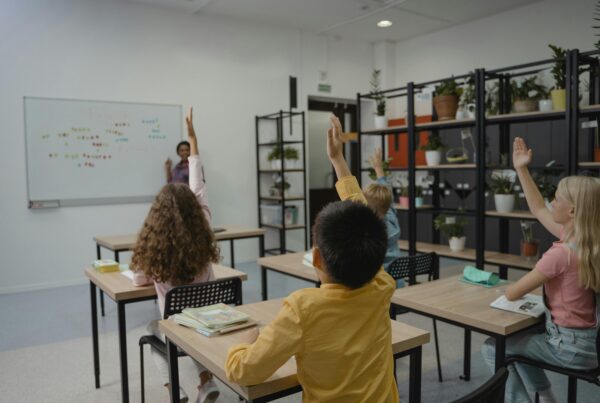What is Professional Learning for Teachers?
Professional learning for teachers refers to the comprehensive set of experiences, activities, and resources that educators engage in to improve their teaching practices, expand their skill sets, and continue their education. This form of learning is not limited to formal training or workshops; it encompasses many opportunities, from peer collaboration to self-directed research. The teaching profession, like many others, is dynamic and ever-evolving. As societal needs, technological advancements, and educational methodologies change, it becomes imperative for teachers to stay updated and adapt. Continuous learning is paramount in the teaching profession because it ensures educators are equipped with the latest knowledge and best practices. This enhances their effectiveness in the classroom and fosters a culture of lifelong learning among their students. Through continuous professional development, teachers can provide the highest quality of education, ensuring their students’ success in an ever-changing world.
The Difference Between Professional Development and Professional Learning
In education and career growth, the terms “professional development” and “professional learning” are often used interchangeably. However, there are distinct differences between the two.
Traditional professional development methods typically involve one-off workshops, seminars, or conferences. These events, while informative, are often more generalised for a school or staff cohort and are not always directly applicable to an individual’s specific context or needs. The content is usually delivered as information transfer, where experts share their knowledge with attendees, often experiencing this in a more passive learning environment. While these methods have their merits, particularly for specific topics, they often lack the continuity and personalisation necessary for genuine skill enhancement and knowledge retention.
In recent years, there has been a significant shift towards professional learning and an increased use of this term. This approach emphasises interactive, sustained, and customised learning experiences. Instead of isolated events, professional learning is a continuous journey where educators and professionals actively engage in collaborative activities, peer discussions, and reflective practices. This shift recognises that for genuine growth to occur, learning must be relevant to the individual, embedded in their daily practice, and evolve.
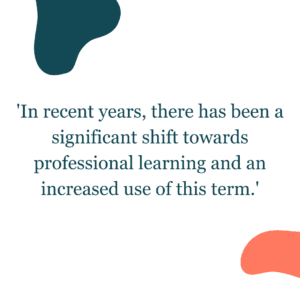
The benefits of this interactive and sustained approach are manifold. Firstly, it allows for deeper understanding and mastery of concepts, as individuals can often apply and refine their knowledge in real-time. Secondly, the customisation ensures that the learning is directly relevant to the individual’s role and challenges, making it more impactful. Lastly, the collaborative nature of professional learning can foster a community of learners where peers support, challenge, and inspire each other, leading to a more enriched and holistic growth experience.
While both professional development and professional learning aim to enhance skills and knowledge, the latter’s interactive, sustained, and personalised approach can make it a more effective tool for long-term growth and success.
Traditional Professional Development Methods
Professional development has long been a cornerstone in the careers of many professionals, especially educators. Traditional methods often encompass one-off workshops, seminars, and conferences. These events, while informative, are typically generalised, offering a broad overview of a topic. Participants attend, absorb information, and then attempt to integrate this newfound knowledge into their practice. However, the passive nature of such learning and its lack of personalisation can make it challenging to apply consistently.
The Shift Towards Professional Learning
In contrast to the episodic nature of traditional professional development, there is a growing emphasis on professional learning. This approach views growth as a continuous journey, not just a destination reached through occasional seminars. Professional learning is more immersive, often integrating collaborative activities, peer discussions, and reflective practices. It’s a shift from passive reception of information to active engagement, where professionals co-create their learning experiences.
Benefits of Interactive, Sustained, and Customised Learning Experiences
The move towards professional learning brings with it several advantages. Interactive learning ensures that individuals are not just passive recipients but active participants, leading to better retention and understanding. Sustained learning experiences, spread over time, allow for the continuous application and refinement of skills and knowledge in real-world contexts. Lastly, customised learning experiences cater to each professional’s unique needs and challenges, ensuring that the learning is relevant and immediately applicable. This tailored approach, combined with the interactive and sustained nature of professional learning, ensures that professionals are better equipped to adapt, grow, and excel in their respective fields.
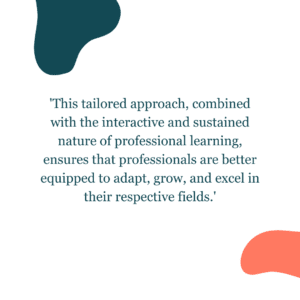
In essence, while both professional development and professional learning aim to foster growth, the latter’s approach is more in tune with the evolving needs of today’s professionals.
Top Evidence-Based Teaching Strategies
In the ever-evolving world of education, educators must engage in professional development and professional learning to help them absorb and employ effective teaching strategies backed by research. These strategies enhance the learning experience and ensure that students grasp concepts thoroughly and retain them for the long term. Here are some top evidence-based teaching strategies that have proven effective in various educational settings and are worth including in a professional learning approach.
Clear Lesson Goals
Every lesson should begin with a clear objective. When students understand the purpose of a lesson and what they’re expected to learn by the end, they’re more likely to engage and participate actively. Setting explicit goals also allows educators to measure the effectiveness of their teaching and make necessary adjustments to meet students’ needs. Peer learning can be a great way to support the improvement of these approaches, as teachers share and analyse each other’s lesson goals.
Show & Tell
Visual aids and demonstrations can significantly enhance the learning experience. Educators can make abstract ideas more tangible by showing students a concept in action. This strategy caters to visual learners and can help reinforce concepts that might be challenging to understand through text alone. Class walkthroughs and observations can be a valuable professional learning approach to foster this approach amongst staff.
Questioning to Check for Understanding
Regularly posing questions to students ensures they follow along and comprehend the material. It also encourages students to think critically and engage with the content. By checking for understanding, educators can identify areas where students might be struggling and address them promptly. Working as a professional learning community (PLC), smaller teams of teachers can work together to innovate a toolkit of questions they can draw on back in their classroom settings.
Summarising New Learning Graphically
Graphic organisers, mind maps, and flowcharts are excellent tools for summarising new information. These visual aids help students organise their thoughts, identify relationships between concepts, and retain information more effectively. Professional learning communities around specific subjects or learning levels help share approaches like these across a staff cohort.
Providing Feedback to Students
Feedback is a powerful tool in the learning process. Constructive feedback helps students understand their strengths and areas for improvement. It should be timely, specific, and actionable, guiding students in enhancing their performance and achieving their learning goals. Specific training in this area is available from various professional learning providers within EC Premium.
Flexibility in Learning Durations
Not all students learn at the same pace. Some might grasp a concept quickly, while others may need more time. Flexibility with learning durations ensures that all students have an equal opportunity to understand and master the material. This might mean breaking up longer lessons into shorter segments or extending the time for certain activities. Short case study videos of innovative school models worldwide can help catalyse more flexible approaches in a school.
Productive Group Work
Collaborative learning can be highly beneficial. Group work encourages students to share ideas, challenge each other’s perspectives, and build on one another’s knowledge. However, for group work to be productive, it is essential to set clear guidelines and ensure each member contributes effectively. Team teaching opportunities can be valuable in demonstrating best practices in this area.
Teaching Strategies Beyond Content
While content knowledge is crucial, educators should also focus on teaching skills like critical thinking, problem-solving, and communication. These skills are invaluable in real-world scenarios and can significantly enhance a student’s ability to apply their knowledge in various contexts. Exposure to other school models through case studies and learning trips can support this.
Nurturing Meta-Cognition
Meta-cognition refers to the awareness and understanding of one’s thought processes. By nurturing meta-cognitive skills, educators empower students to evaluate their learning strategies, recognise their strengths and weaknesses, and adjust their approach accordingly. This self-awareness can lead to more effective learning and better retention of information. Coaching and mentoring approaches can help support reflection of this nature.
In Summary
The world of education is vast and diverse, but specific teaching strategies have consistently proven effective across various settings. By incorporating these evidence-based techniques into their teaching, educators can ensure that their students receive a comprehensive, engaging, and effective learning experience. Whether it’s setting clear goals, using visual aids, or nurturing meta-cognitive skills, these strategies are essential tools in the modern educator’s toolkit.
Characteristics of High-Quality Professional Learning
Content and Standards Alignment
High-quality professional learning should be intricately aligned with both the content educators are teaching and the standards they’re expected to meet. This ensures the training is relevant, immediately applicable, and designed to elevate teaching practices to meet or exceed established benchmarks.
Active Learning Incorporation
Good professional learning ensures that participants are not just passive recipients of information but engage in hands-on activities, simulations, and discussions. Active learning fosters more profound understanding, encourages critical thinking, and ensures educators can practically apply their newfound knowledge in real-world classroom settings.
Job-Embedded Nature
Effective professional learning should not be seen as an isolated event but instead needs to be woven into the fabric of an educator’s daily tasks. It needs to be contextual, allowing educators to learn and apply new strategies within the scope of their roles, making the learning experience more relevant and impactful.
Collaboration Among Educators
Collaborative environments in good professional learning can promote the sharing of ideas, strategies, and experiences. By working together, educators can learn from each other’s successes and challenges, fostering a community of continuous growth and mutual support.
Role of Coaching and Mentorship
Coaching and mentorship, when used as a professional learning tool, can provide educators with personalised guidance unique to their role. Experienced mentors offer insights, feedback, and support, ensuring that educators acquire new skills and refine and perfect them over time.
Sustained and Continuous Learning Experiences
Learning is an ongoing journey. High-quality professional development recognises this and offers opportunities for educators to engage in long-term, continuous learning, ensuring they stay updated with the latest educational trends and methodologies.
Alignment with School Goals and Standards
For professional learning to be truly effective, it must align with the broader goals and standards of the school or educational institution. This ensures a cohesive approach to education, where individual growth translates into collective progress.
High-quality professional learning is multifaceted, incorporating various elements to ensure educators are equipped, empowered, and inspired to deliver their best in the classroom.
The Role of Education Changemakers in Professional Learning
Definition and Importance of Education Changemakers
Education Changemakers are individuals or groups who pioneer innovative teaching, learning, and professional development approaches. They challenge traditional norms, introduce fresh perspectives, and drive transformative changes within the educational landscape. These changemakers can be teachers, administrators, policymakers, or even students. Their primary characteristic is a deep passion for education and a vision for a better, more inclusive, and effective learning environment. The importance of Education Changemakers lies in their ability to identify gaps, inefficiencies, or outdated practices in the current system and propose actionable solutions. They serve as catalysts, inspiring others to rethink, reimagine, and reshape the future of education.
How Education Changemakers Impact Professional Growth
The influence of Education Changemakers on professional growth across a school can be profound. By introducing and advocating for innovative teaching methods, tools, and strategies, they provide educators with new avenues for development. They create platforms where educators can collaborate, share insights, and learn from one another, fostering a culture of continuous improvement.
Furthermore, by challenging the status quo, Education Changemakers encourage educators to be reflective and critical of their practices. This prompts teachers and administrators to seek further training, resources, and collaborations, ensuring their skills and methodologies remain relevant and practical.
Education Changemakers play a pivotal role in shaping the trajectory of professional learning. Their visionary approach, coupled with their commitment to excellence, ensures that educators are equipped for the present and prepared to navigate the evolving challenges of the future.
FAQ’s
What is a Professional Learning Community?
A Professional Learning Community (PLC) emphasises learning rather than teaching, encourages collaborative work, and holds educators accountable for results. It’s a systematic process where teachers collaborate to analyse and improve their classroom practices, ensuring that students are taught and genuinely learn.
How does a Professional Learning Community differ from traditional professional development?
Unlike traditional professional development, PLCs involve ongoing collaboration among teachers. They work in teams to discuss and analyse student performance, share teaching strategies, and implement changes based on real-time data.
Why is collaboration essential in a Professional Learning Community?
Collaboration in PLCs ensures that teachers are not working in isolation. By sharing ideas, materials, and strategies, teachers can collectively address challenges, learn from each other’s successes, and ensure a consistent, high-quality learning experience for all students.
How do Professional Learning Communities measure their effectiveness?
PLCs judge their effectiveness based on results. This involves setting clear goals related to student achievement, monitoring progress through data analysis, and making necessary adjustments to teaching strategies to ensure continuous improvement.
